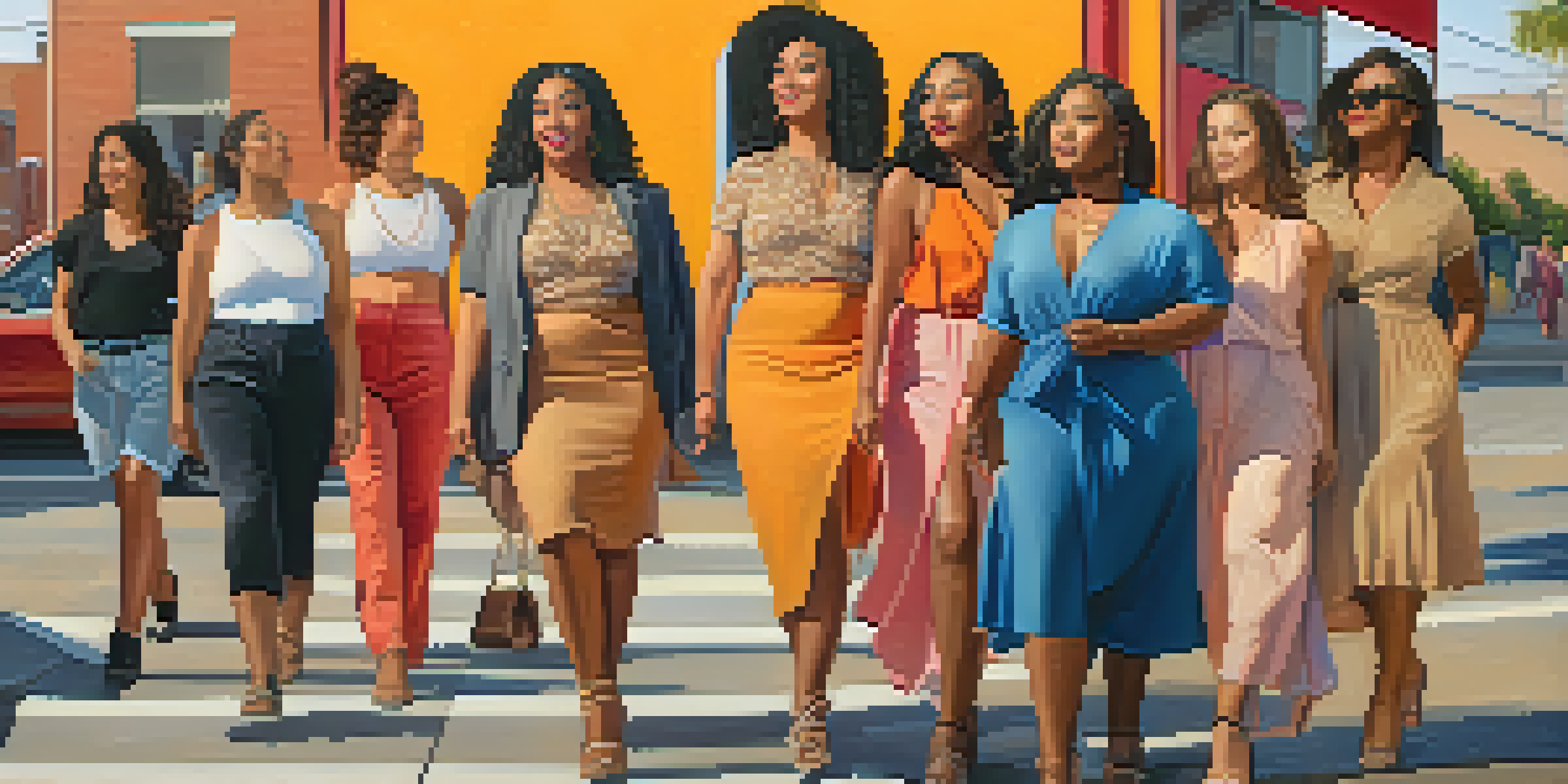Fashion Campaigns That Successfully Promote Gender Equality

The Power of Fashion in Social Change
Fashion is more than just clothing; it serves as a powerful medium for social change. Through innovative campaigns, brands can voice support for gender equality, challenging traditional norms and stereotypes. By leveraging their influence, fashion companies can inspire consumers to advocate for a more equitable society.
Fashion is the armor to survive the reality of everyday life.
For instance, when a brand highlights stories of marginalized groups, it not only raises awareness but also shows solidarity. This approach can transform the perception of gender roles, making them more inclusive. The impact of such campaigns often resonates beyond the fashion industry, sparking broader conversations around equality.
Ultimately, fashion can be a rallying point for social justice, illustrating how style and values can intertwine. By connecting with audiences on a deeper level, brands can foster engagement and drive meaningful change in gender equality.
Dove's Real Beauty Campaign: Redefining Standards
Dove's Real Beauty Campaign is a landmark example of using fashion and beauty to promote gender equality. Launched in 2004, it challenged conventional beauty standards by featuring women of various shapes, sizes, and ethnicities. This inclusive approach not only empowers women but also encourages self-acceptance and confidence.

Through powerful imagery and authentic storytelling, Dove successfully shifted the narrative around beauty. The campaign sparked conversations about body positivity and the unrealistic expectations often portrayed in media. By doing so, it inspired women everywhere to embrace their unique beauty.
Fashion as a Tool for Change
Fashion brands can leverage their influence to promote social change, especially in advocating for gender equality.
Moreover, Dove's commitment to social change is evident in its ongoing initiatives. The brand continues to support education and self-esteem programs for young girls, demonstrating that their mission extends beyond marketing. This holistic approach reinforces the message that true beauty encompasses diversity and self-love.
Gucci's Chime for Change: A Global Movement
Gucci’s Chime for Change campaign embodies the fashion industry's potential to drive global conversations around gender equality. Launched in 2013, this initiative aimed to raise funds and awareness for female empowerment projects worldwide. By partnering with influential figures and organizations, Gucci created a platform for women’s voices to be heard.
The future is in the hands of those who can give future generations reasons to hope.
The campaign used compelling visuals and emotional storytelling to highlight the challenges women face across different cultures. This approach resonated with audiences, encouraging them to take action and support gender equality initiatives. Gucci's commitment to this cause illustrates how a luxury brand can lead important discussions in society.
Furthermore, Chime for Change has established a legacy of collaboration and advocacy. By fostering partnerships with local and global organizations, Gucci amplifies the impact of its efforts. This campaign not only raises funds but also builds a community of individuals committed to uplifting women everywhere.
Nike's Equality Campaign: Sport for Everyone
Nike has long been a champion of inclusivity, and their Equality campaign is a testament to that ethos. Launched in 2017, this initiative promotes the idea that everyone should have equal access to sports and opportunities. Through powerful ads featuring athletes from diverse backgrounds, Nike emphasizes that talent knows no gender.
The campaign's message is clear: equality in sports leads to equality in life. By showcasing real stories of athletes overcoming obstacles, Nike inspires young girls to pursue their dreams fearlessly. This narrative not only boosts visibility for women in sports but also encourages dialogue around gender equity.
Dove Redefines Beauty Standards
Dove's Real Beauty Campaign empowers women by challenging conventional beauty standards through inclusivity.
Additionally, Nike's commitment extends to creating products that cater to all athletes, regardless of gender. By prioritizing inclusivity in their offerings, the brand sets a standard for the industry. This multifaceted approach demonstrates that sports and fashion can work together to create a more equitable world.
Chanel's Women Empowerment Initiatives
Chanel has taken significant strides toward promoting gender equality through its women empowerment initiatives. The brand not only champions female creativity in fashion but also invests in programs that uplift and support women in various fields. This commitment to empowerment is woven into the fabric of Chanel's identity.
One notable initiative is the Chanel Foundation, which funds projects aimed at advancing women's rights and leadership. By supporting education and entrepreneurship, Chanel is helping women overcome barriers in their careers. This focus on empowerment aligns seamlessly with the brand's legacy of challenging societal norms.
Moreover, Chanel uses its platform to highlight the achievements of women in the arts and sciences. By celebrating female talent, the brand fosters a culture of recognition and respect. This approach not only strengthens the brand's reputation but also contributes to a more inclusive and equitable society.
H&M's Conscious Campaign: Sustainability Meets Equality
H&M's Conscious Campaign showcases how sustainability and gender equality can go hand in hand. By promoting ethical fashion practices, the brand highlights the importance of empowering women in the supply chain. This initiative not only supports female workers but also emphasizes the role of fashion in creating a better world.
Through transparent storytelling, H&M shares the journeys of women who benefit from fair wages and safe working conditions. This approach humanizes the impact of the fashion industry and encourages consumers to think critically about their purchases. By fostering awareness, H&M inspires positive consumer behavior.
Gucci's Global Empowerment Efforts
Gucci’s Chime for Change campaign effectively raises awareness and funds for female empowerment initiatives worldwide.
Additionally, the brand actively collaborates with organizations that focus on women's rights and development. This commitment to social responsibility enhances H&M's mission of promoting gender equality. Ultimately, the Conscious Campaign illustrates that fashion can be both stylish and socially responsible.
Fenty Beauty: Redefining Inclusivity in Beauty
Fenty Beauty, founded by Rihanna, has revolutionized the beauty industry with its commitment to inclusivity. Launched in 2017, the brand offers a diverse range of shades that cater to all skin tones. This approach challenges the traditional beauty standards and promotes a message of acceptance that resonates with many.
The brand's marketing strategies often celebrate individuality and self-expression, empowering consumers to embrace their unique identities. Fenty Beauty's campaigns feature models of various ethnicities, body types, and genders, reinforcing the idea that beauty comes in all forms. This representation fosters a sense of belonging and confidence among its audience.

Moreover, Fenty Beauty's impact extends beyond products; it advocates for social change through various initiatives. By collaborating with organizations that support women and marginalized communities, the brand amplifies its message of empowerment. This commitment showcases how beauty and fashion can contribute to a more equitable society.
Conclusion: Fashion as a Catalyst for Change
Fashion campaigns that promote gender equality have the potential to spark significant cultural shifts. By using their platforms to raise awareness and support diverse voices, brands can foster a more inclusive society. As consumers, we can play a role in this change by supporting brands that align with our values.
The examples discussed in this article illustrate how impactful initiatives can resonate with audiences and drive social change. From challenging beauty standards to promoting inclusivity in sports, these campaigns demonstrate the power of fashion as a catalyst for equality. The fashion industry, when used responsibly, can inspire hope and progress.
Ultimately, as we continue to navigate the complexities of gender equality, the role of fashion will remain crucial. By embracing diversity and advocating for women's rights, the industry can contribute meaningfully to a more equitable future for all. Together, let’s celebrate and support these efforts in fashion and beyond.